MGTP102 Assessment: Organizational Culture and Performance Essay
VerifiedAdded on 2022/11/24
|7
|2065
|341
Essay
AI Summary
This essay argues that a strong organizational culture is essential for superior organizational performance. It explores various factors that contribute to a robust culture, including employee motivation, training programs, established values and norms, and effective communication channels. The essay emphasizes the importance of employee motivation, highlighting the application of Maslow's hierarchy of needs to understand and address employee needs. It further examines the impact of training in enhancing skills and knowledge, ultimately leading to a positive work environment. The essay also underscores the significance of clear communication and the adherence to principles and values in fostering a culture that supports workers and drives organizational success. The conclusion reinforces the positive correlation between a strong organizational culture and enhanced employee performance, thereby validating the initial argument.
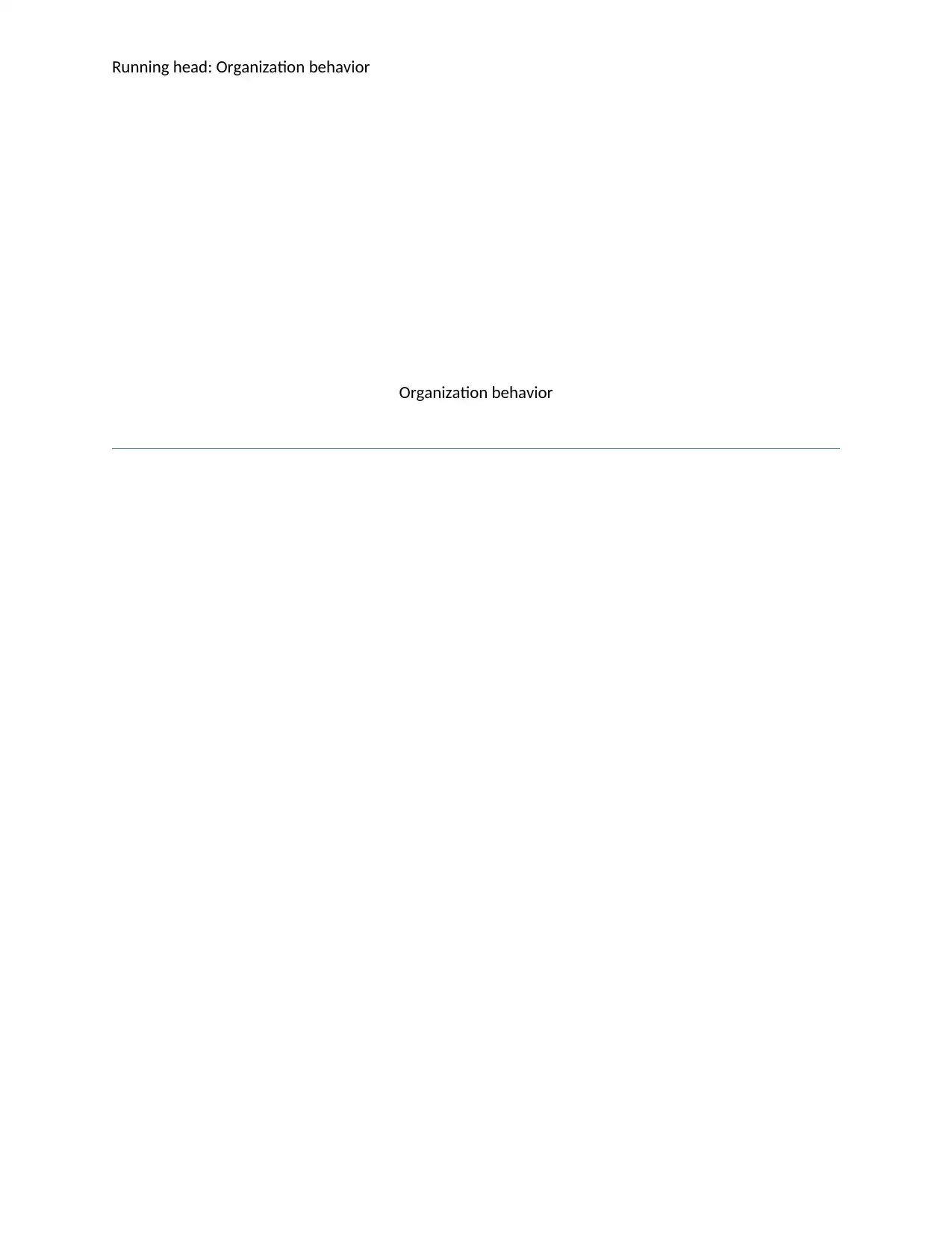
Running head: Organization behavior
Organization behavior
Organization behavior
Paraphrase This Document
Need a fresh take? Get an instant paraphrase of this document with our AI Paraphraser
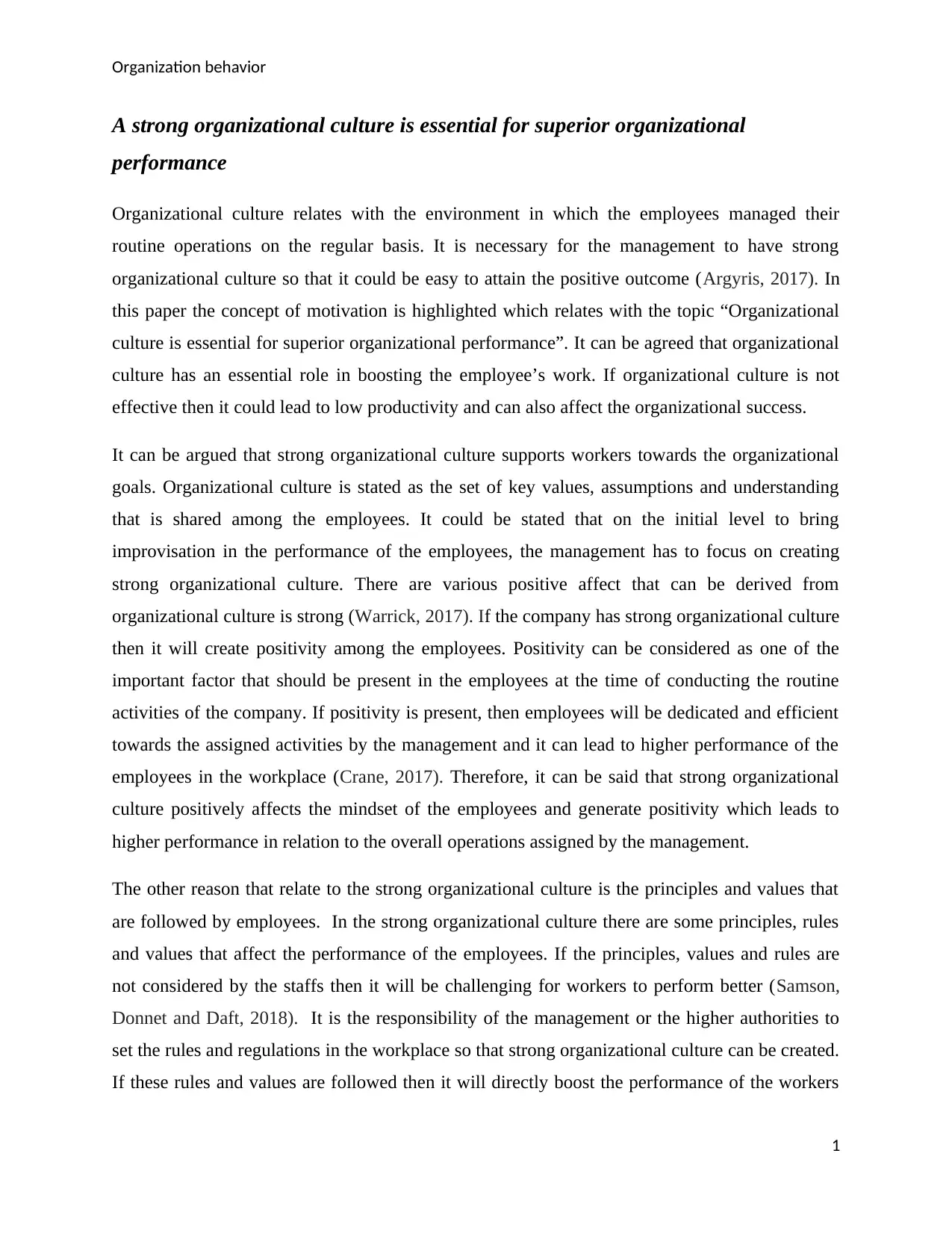
Organization behavior
A strong organizational culture is essential for superior organizational
performance
Organizational culture relates with the environment in which the employees managed their
routine operations on the regular basis. It is necessary for the management to have strong
organizational culture so that it could be easy to attain the positive outcome (Argyris, 2017). In
this paper the concept of motivation is highlighted which relates with the topic “Organizational
culture is essential for superior organizational performance”. It can be agreed that organizational
culture has an essential role in boosting the employee’s work. If organizational culture is not
effective then it could lead to low productivity and can also affect the organizational success.
It can be argued that strong organizational culture supports workers towards the organizational
goals. Organizational culture is stated as the set of key values, assumptions and understanding
that is shared among the employees. It could be stated that on the initial level to bring
improvisation in the performance of the employees, the management has to focus on creating
strong organizational culture. There are various positive affect that can be derived from
organizational culture is strong (Warrick, 2017). If the company has strong organizational culture
then it will create positivity among the employees. Positivity can be considered as one of the
important factor that should be present in the employees at the time of conducting the routine
activities of the company. If positivity is present, then employees will be dedicated and efficient
towards the assigned activities by the management and it can lead to higher performance of the
employees in the workplace (Crane, 2017). Therefore, it can be said that strong organizational
culture positively affects the mindset of the employees and generate positivity which leads to
higher performance in relation to the overall operations assigned by the management.
The other reason that relate to the strong organizational culture is the principles and values that
are followed by employees. In the strong organizational culture there are some principles, rules
and values that affect the performance of the employees. If the principles, values and rules are
not considered by the staffs then it will be challenging for workers to perform better (Samson,
Donnet and Daft, 2018). It is the responsibility of the management or the higher authorities to
set the rules and regulations in the workplace so that strong organizational culture can be created.
If these rules and values are followed then it will directly boost the performance of the workers
1
A strong organizational culture is essential for superior organizational
performance
Organizational culture relates with the environment in which the employees managed their
routine operations on the regular basis. It is necessary for the management to have strong
organizational culture so that it could be easy to attain the positive outcome (Argyris, 2017). In
this paper the concept of motivation is highlighted which relates with the topic “Organizational
culture is essential for superior organizational performance”. It can be agreed that organizational
culture has an essential role in boosting the employee’s work. If organizational culture is not
effective then it could lead to low productivity and can also affect the organizational success.
It can be argued that strong organizational culture supports workers towards the organizational
goals. Organizational culture is stated as the set of key values, assumptions and understanding
that is shared among the employees. It could be stated that on the initial level to bring
improvisation in the performance of the employees, the management has to focus on creating
strong organizational culture. There are various positive affect that can be derived from
organizational culture is strong (Warrick, 2017). If the company has strong organizational culture
then it will create positivity among the employees. Positivity can be considered as one of the
important factor that should be present in the employees at the time of conducting the routine
activities of the company. If positivity is present, then employees will be dedicated and efficient
towards the assigned activities by the management and it can lead to higher performance of the
employees in the workplace (Crane, 2017). Therefore, it can be said that strong organizational
culture positively affects the mindset of the employees and generate positivity which leads to
higher performance in relation to the overall operations assigned by the management.
The other reason that relate to the strong organizational culture is the principles and values that
are followed by employees. In the strong organizational culture there are some principles, rules
and values that affect the performance of the employees. If the principles, values and rules are
not considered by the staffs then it will be challenging for workers to perform better (Samson,
Donnet and Daft, 2018). It is the responsibility of the management or the higher authorities to
set the rules and regulations in the workplace so that strong organizational culture can be created.
If these rules and values are followed then it will directly boost the performance of the workers
1
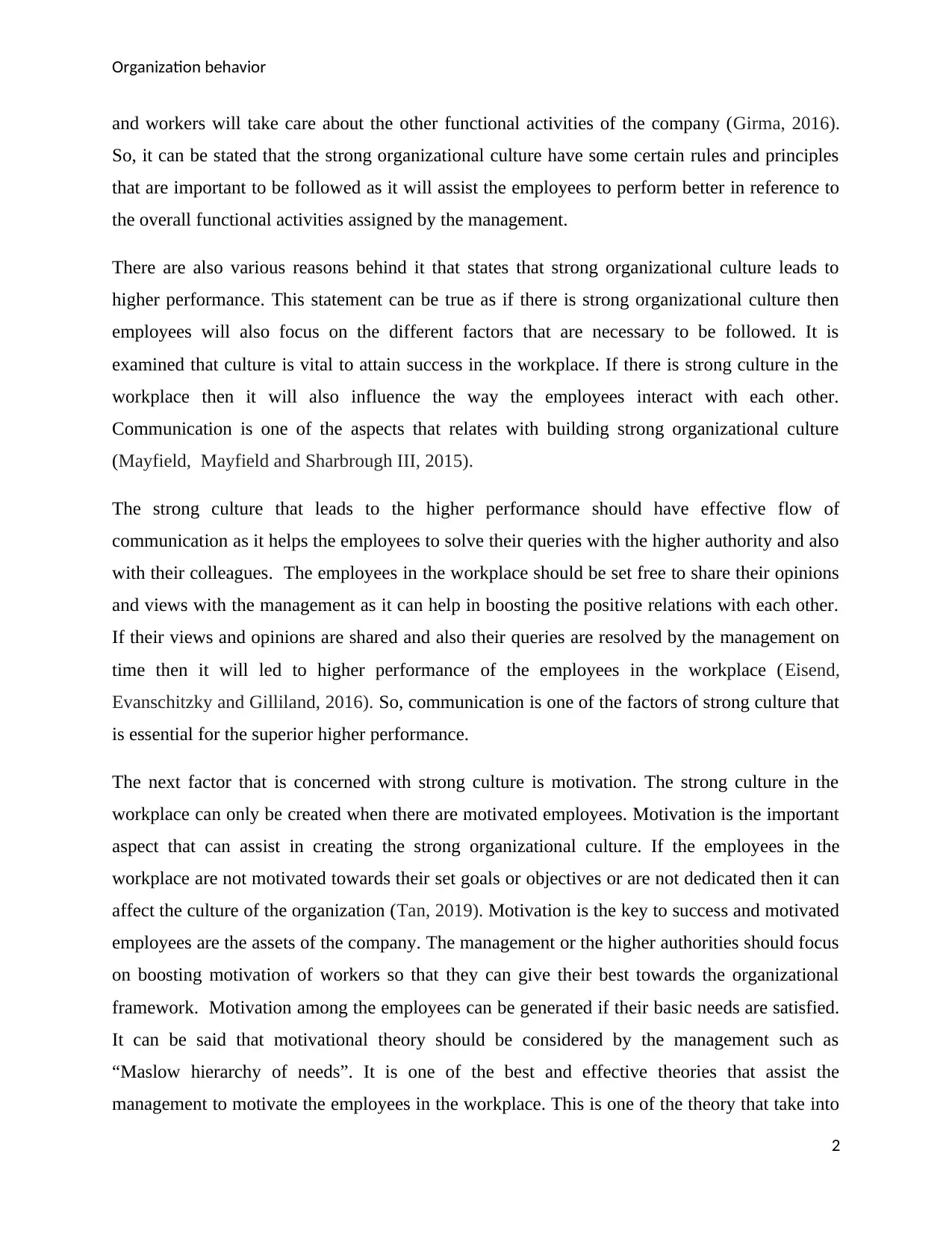
Organization behavior
and workers will take care about the other functional activities of the company (Girma, 2016).
So, it can be stated that the strong organizational culture have some certain rules and principles
that are important to be followed as it will assist the employees to perform better in reference to
the overall functional activities assigned by the management.
There are also various reasons behind it that states that strong organizational culture leads to
higher performance. This statement can be true as if there is strong organizational culture then
employees will also focus on the different factors that are necessary to be followed. It is
examined that culture is vital to attain success in the workplace. If there is strong culture in the
workplace then it will also influence the way the employees interact with each other.
Communication is one of the aspects that relates with building strong organizational culture
(Mayfield, Mayfield and Sharbrough III, 2015).
The strong culture that leads to the higher performance should have effective flow of
communication as it helps the employees to solve their queries with the higher authority and also
with their colleagues. The employees in the workplace should be set free to share their opinions
and views with the management as it can help in boosting the positive relations with each other.
If their views and opinions are shared and also their queries are resolved by the management on
time then it will led to higher performance of the employees in the workplace (Eisend,
Evanschitzky and Gilliland, 2016). So, communication is one of the factors of strong culture that
is essential for the superior higher performance.
The next factor that is concerned with strong culture is motivation. The strong culture in the
workplace can only be created when there are motivated employees. Motivation is the important
aspect that can assist in creating the strong organizational culture. If the employees in the
workplace are not motivated towards their set goals or objectives or are not dedicated then it can
affect the culture of the organization (Tan, 2019). Motivation is the key to success and motivated
employees are the assets of the company. The management or the higher authorities should focus
on boosting motivation of workers so that they can give their best towards the organizational
framework. Motivation among the employees can be generated if their basic needs are satisfied.
It can be said that motivational theory should be considered by the management such as
“Maslow hierarchy of needs”. It is one of the best and effective theories that assist the
management to motivate the employees in the workplace. This is one of the theory that take into
2
and workers will take care about the other functional activities of the company (Girma, 2016).
So, it can be stated that the strong organizational culture have some certain rules and principles
that are important to be followed as it will assist the employees to perform better in reference to
the overall functional activities assigned by the management.
There are also various reasons behind it that states that strong organizational culture leads to
higher performance. This statement can be true as if there is strong organizational culture then
employees will also focus on the different factors that are necessary to be followed. It is
examined that culture is vital to attain success in the workplace. If there is strong culture in the
workplace then it will also influence the way the employees interact with each other.
Communication is one of the aspects that relates with building strong organizational culture
(Mayfield, Mayfield and Sharbrough III, 2015).
The strong culture that leads to the higher performance should have effective flow of
communication as it helps the employees to solve their queries with the higher authority and also
with their colleagues. The employees in the workplace should be set free to share their opinions
and views with the management as it can help in boosting the positive relations with each other.
If their views and opinions are shared and also their queries are resolved by the management on
time then it will led to higher performance of the employees in the workplace (Eisend,
Evanschitzky and Gilliland, 2016). So, communication is one of the factors of strong culture that
is essential for the superior higher performance.
The next factor that is concerned with strong culture is motivation. The strong culture in the
workplace can only be created when there are motivated employees. Motivation is the important
aspect that can assist in creating the strong organizational culture. If the employees in the
workplace are not motivated towards their set goals or objectives or are not dedicated then it can
affect the culture of the organization (Tan, 2019). Motivation is the key to success and motivated
employees are the assets of the company. The management or the higher authorities should focus
on boosting motivation of workers so that they can give their best towards the organizational
framework. Motivation among the employees can be generated if their basic needs are satisfied.
It can be said that motivational theory should be considered by the management such as
“Maslow hierarchy of needs”. It is one of the best and effective theories that assist the
management to motivate the employees in the workplace. This is one of the theory that take into
2
⊘ This is a preview!⊘
Do you want full access?
Subscribe today to unlock all pages.

Trusted by 1+ million students worldwide
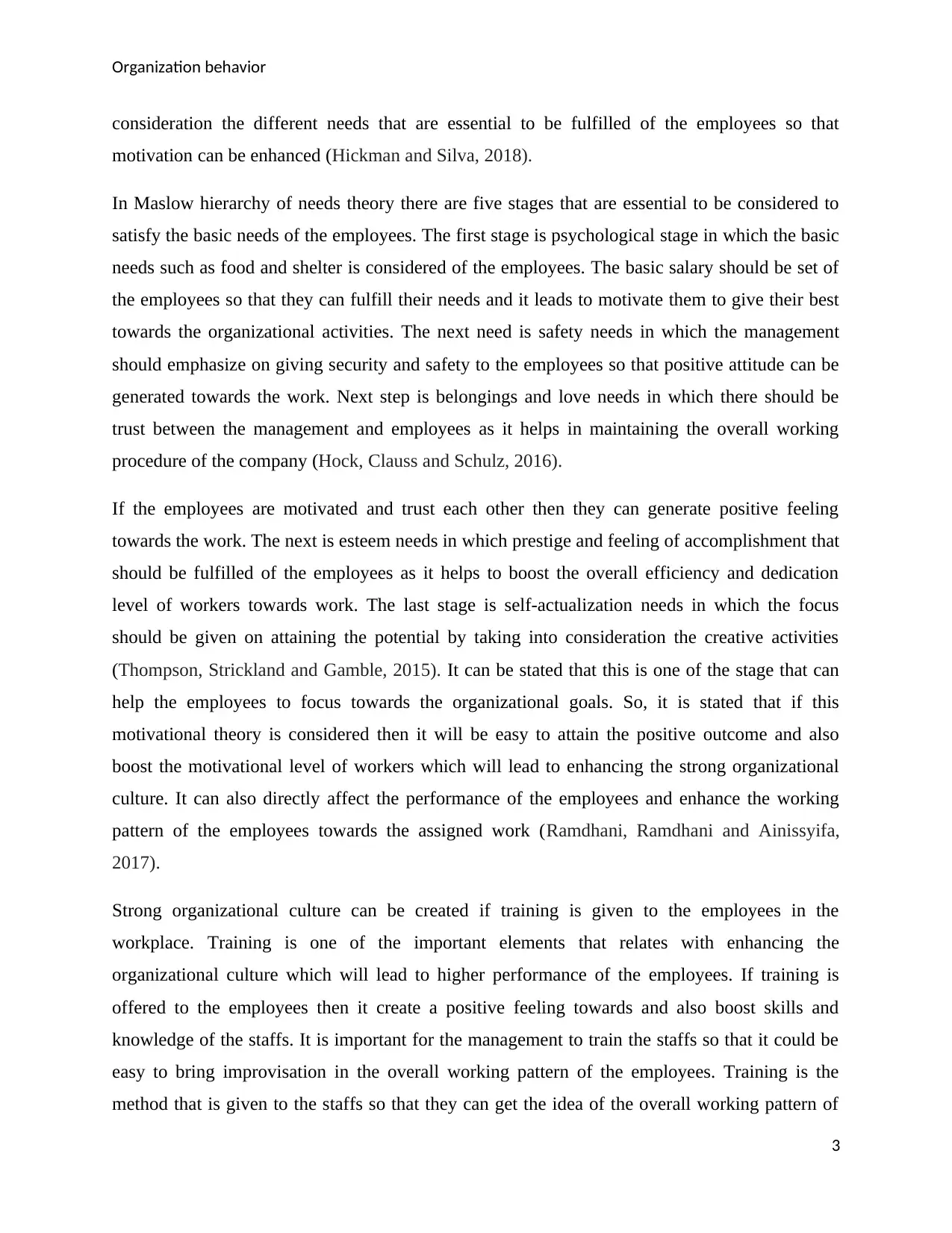
Organization behavior
consideration the different needs that are essential to be fulfilled of the employees so that
motivation can be enhanced (Hickman and Silva, 2018).
In Maslow hierarchy of needs theory there are five stages that are essential to be considered to
satisfy the basic needs of the employees. The first stage is psychological stage in which the basic
needs such as food and shelter is considered of the employees. The basic salary should be set of
the employees so that they can fulfill their needs and it leads to motivate them to give their best
towards the organizational activities. The next need is safety needs in which the management
should emphasize on giving security and safety to the employees so that positive attitude can be
generated towards the work. Next step is belongings and love needs in which there should be
trust between the management and employees as it helps in maintaining the overall working
procedure of the company (Hock, Clauss and Schulz, 2016).
If the employees are motivated and trust each other then they can generate positive feeling
towards the work. The next is esteem needs in which prestige and feeling of accomplishment that
should be fulfilled of the employees as it helps to boost the overall efficiency and dedication
level of workers towards work. The last stage is self-actualization needs in which the focus
should be given on attaining the potential by taking into consideration the creative activities
(Thompson, Strickland and Gamble, 2015). It can be stated that this is one of the stage that can
help the employees to focus towards the organizational goals. So, it is stated that if this
motivational theory is considered then it will be easy to attain the positive outcome and also
boost the motivational level of workers which will lead to enhancing the strong organizational
culture. It can also directly affect the performance of the employees and enhance the working
pattern of the employees towards the assigned work (Ramdhani, Ramdhani and Ainissyifa,
2017).
Strong organizational culture can be created if training is given to the employees in the
workplace. Training is one of the important elements that relates with enhancing the
organizational culture which will lead to higher performance of the employees. If training is
offered to the employees then it create a positive feeling towards and also boost skills and
knowledge of the staffs. It is important for the management to train the staffs so that it could be
easy to bring improvisation in the overall working pattern of the employees. Training is the
method that is given to the staffs so that they can get the idea of the overall working pattern of
3
consideration the different needs that are essential to be fulfilled of the employees so that
motivation can be enhanced (Hickman and Silva, 2018).
In Maslow hierarchy of needs theory there are five stages that are essential to be considered to
satisfy the basic needs of the employees. The first stage is psychological stage in which the basic
needs such as food and shelter is considered of the employees. The basic salary should be set of
the employees so that they can fulfill their needs and it leads to motivate them to give their best
towards the organizational activities. The next need is safety needs in which the management
should emphasize on giving security and safety to the employees so that positive attitude can be
generated towards the work. Next step is belongings and love needs in which there should be
trust between the management and employees as it helps in maintaining the overall working
procedure of the company (Hock, Clauss and Schulz, 2016).
If the employees are motivated and trust each other then they can generate positive feeling
towards the work. The next is esteem needs in which prestige and feeling of accomplishment that
should be fulfilled of the employees as it helps to boost the overall efficiency and dedication
level of workers towards work. The last stage is self-actualization needs in which the focus
should be given on attaining the potential by taking into consideration the creative activities
(Thompson, Strickland and Gamble, 2015). It can be stated that this is one of the stage that can
help the employees to focus towards the organizational goals. So, it is stated that if this
motivational theory is considered then it will be easy to attain the positive outcome and also
boost the motivational level of workers which will lead to enhancing the strong organizational
culture. It can also directly affect the performance of the employees and enhance the working
pattern of the employees towards the assigned work (Ramdhani, Ramdhani and Ainissyifa,
2017).
Strong organizational culture can be created if training is given to the employees in the
workplace. Training is one of the important elements that relates with enhancing the
organizational culture which will lead to higher performance of the employees. If training is
offered to the employees then it create a positive feeling towards and also boost skills and
knowledge of the staffs. It is important for the management to train the staffs so that it could be
easy to bring improvisation in the overall working pattern of the employees. Training is the
method that is given to the staffs so that they can get the idea of the overall working pattern of
3
Paraphrase This Document
Need a fresh take? Get an instant paraphrase of this document with our AI Paraphraser
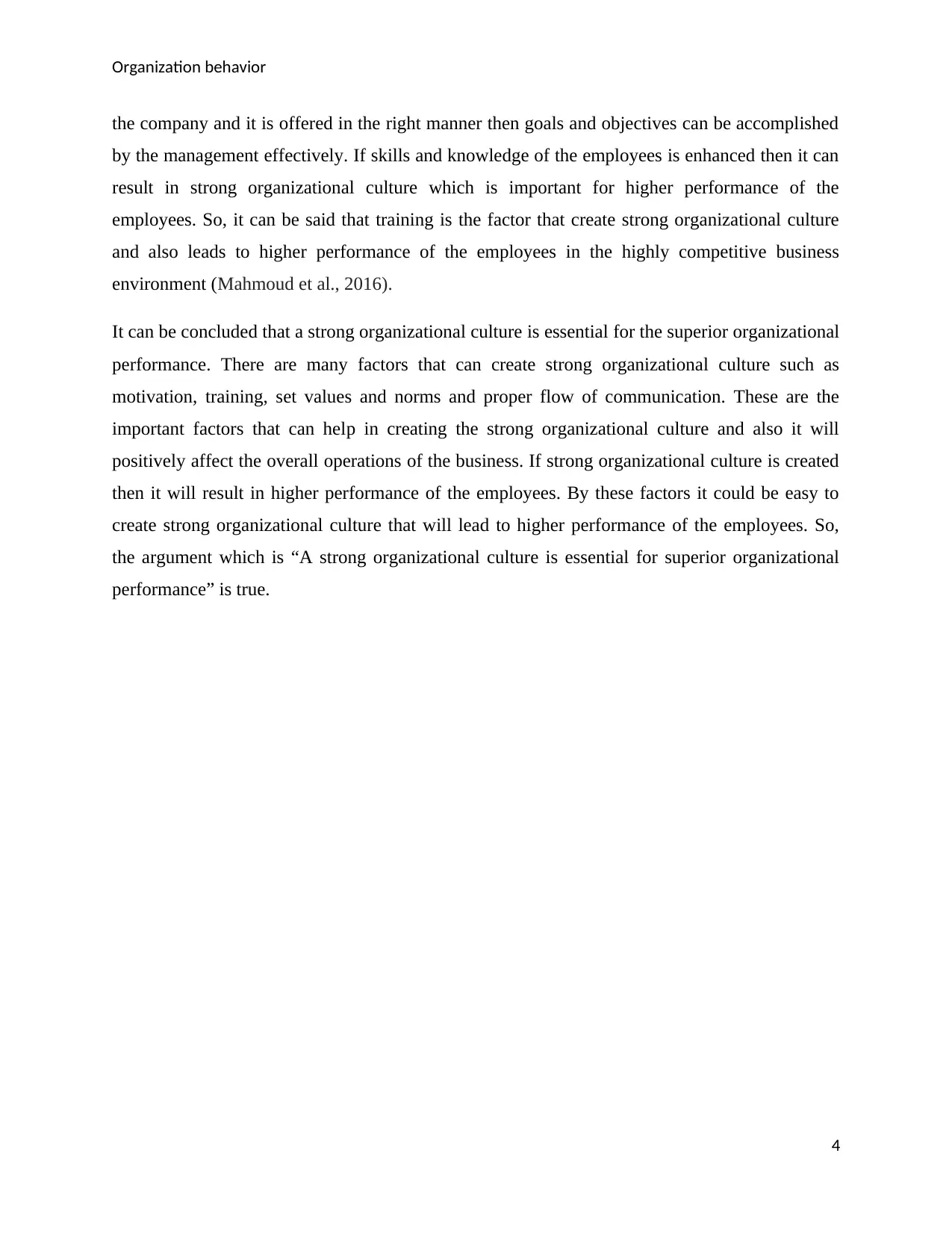
Organization behavior
the company and it is offered in the right manner then goals and objectives can be accomplished
by the management effectively. If skills and knowledge of the employees is enhanced then it can
result in strong organizational culture which is important for higher performance of the
employees. So, it can be said that training is the factor that create strong organizational culture
and also leads to higher performance of the employees in the highly competitive business
environment (Mahmoud et al., 2016).
It can be concluded that a strong organizational culture is essential for the superior organizational
performance. There are many factors that can create strong organizational culture such as
motivation, training, set values and norms and proper flow of communication. These are the
important factors that can help in creating the strong organizational culture and also it will
positively affect the overall operations of the business. If strong organizational culture is created
then it will result in higher performance of the employees. By these factors it could be easy to
create strong organizational culture that will lead to higher performance of the employees. So,
the argument which is “A strong organizational culture is essential for superior organizational
performance” is true.
4
the company and it is offered in the right manner then goals and objectives can be accomplished
by the management effectively. If skills and knowledge of the employees is enhanced then it can
result in strong organizational culture which is important for higher performance of the
employees. So, it can be said that training is the factor that create strong organizational culture
and also leads to higher performance of the employees in the highly competitive business
environment (Mahmoud et al., 2016).
It can be concluded that a strong organizational culture is essential for the superior organizational
performance. There are many factors that can create strong organizational culture such as
motivation, training, set values and norms and proper flow of communication. These are the
important factors that can help in creating the strong organizational culture and also it will
positively affect the overall operations of the business. If strong organizational culture is created
then it will result in higher performance of the employees. By these factors it could be easy to
create strong organizational culture that will lead to higher performance of the employees. So,
the argument which is “A strong organizational culture is essential for superior organizational
performance” is true.
4
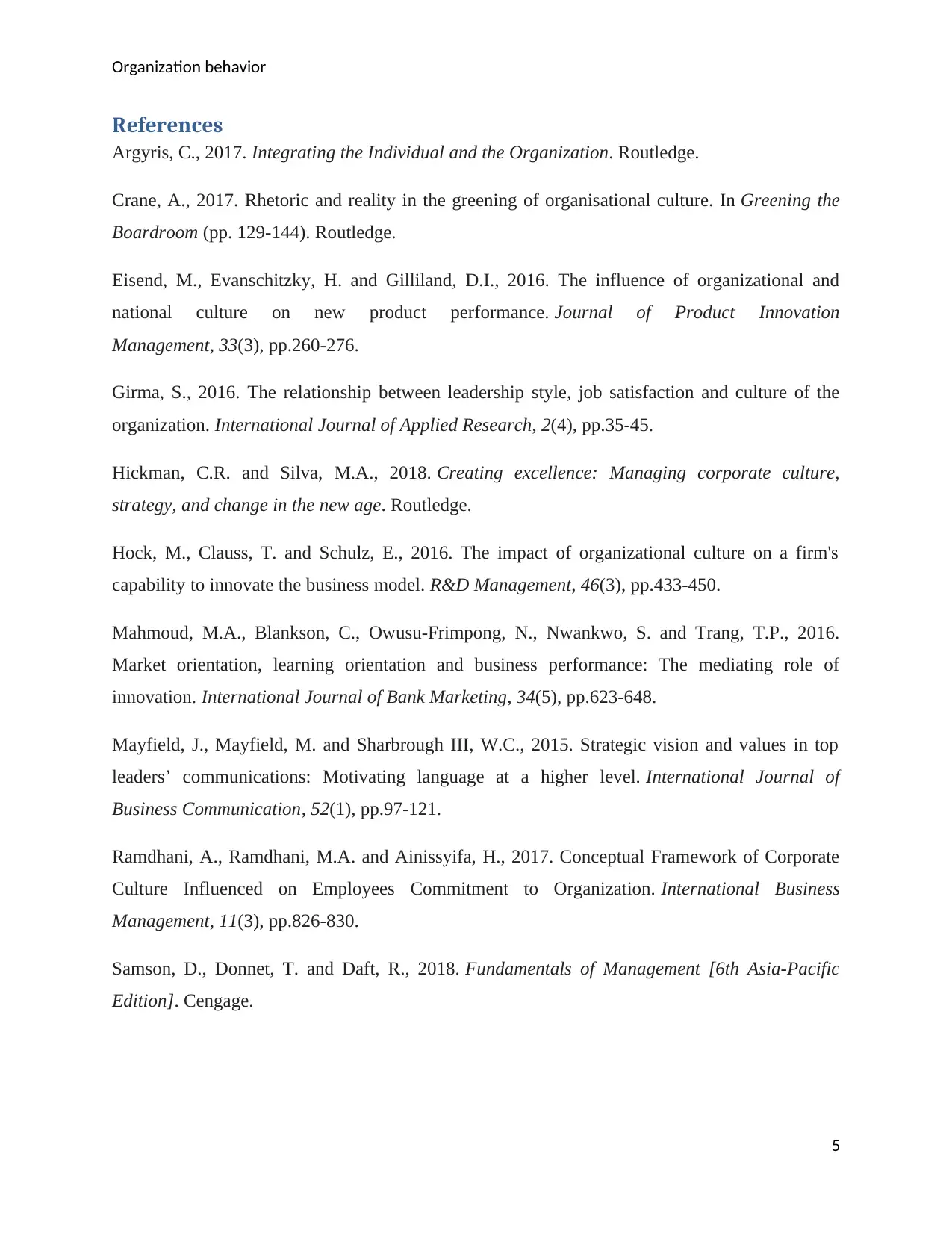
Organization behavior
References
Argyris, C., 2017. Integrating the Individual and the Organization. Routledge.
Crane, A., 2017. Rhetoric and reality in the greening of organisational culture. In Greening the
Boardroom (pp. 129-144). Routledge.
Eisend, M., Evanschitzky, H. and Gilliland, D.I., 2016. The influence of organizational and
national culture on new product performance. Journal of Product Innovation
Management, 33(3), pp.260-276.
Girma, S., 2016. The relationship between leadership style, job satisfaction and culture of the
organization. International Journal of Applied Research, 2(4), pp.35-45.
Hickman, C.R. and Silva, M.A., 2018. Creating excellence: Managing corporate culture,
strategy, and change in the new age. Routledge.
Hock, M., Clauss, T. and Schulz, E., 2016. The impact of organizational culture on a firm's
capability to innovate the business model. R&D Management, 46(3), pp.433-450.
Mahmoud, M.A., Blankson, C., Owusu-Frimpong, N., Nwankwo, S. and Trang, T.P., 2016.
Market orientation, learning orientation and business performance: The mediating role of
innovation. International Journal of Bank Marketing, 34(5), pp.623-648.
Mayfield, J., Mayfield, M. and Sharbrough III, W.C., 2015. Strategic vision and values in top
leaders’ communications: Motivating language at a higher level. International Journal of
Business Communication, 52(1), pp.97-121.
Ramdhani, A., Ramdhani, M.A. and Ainissyifa, H., 2017. Conceptual Framework of Corporate
Culture Influenced on Employees Commitment to Organization. International Business
Management, 11(3), pp.826-830.
Samson, D., Donnet, T. and Daft, R., 2018. Fundamentals of Management [6th Asia-Pacific
Edition]. Cengage.
5
References
Argyris, C., 2017. Integrating the Individual and the Organization. Routledge.
Crane, A., 2017. Rhetoric and reality in the greening of organisational culture. In Greening the
Boardroom (pp. 129-144). Routledge.
Eisend, M., Evanschitzky, H. and Gilliland, D.I., 2016. The influence of organizational and
national culture on new product performance. Journal of Product Innovation
Management, 33(3), pp.260-276.
Girma, S., 2016. The relationship between leadership style, job satisfaction and culture of the
organization. International Journal of Applied Research, 2(4), pp.35-45.
Hickman, C.R. and Silva, M.A., 2018. Creating excellence: Managing corporate culture,
strategy, and change in the new age. Routledge.
Hock, M., Clauss, T. and Schulz, E., 2016. The impact of organizational culture on a firm's
capability to innovate the business model. R&D Management, 46(3), pp.433-450.
Mahmoud, M.A., Blankson, C., Owusu-Frimpong, N., Nwankwo, S. and Trang, T.P., 2016.
Market orientation, learning orientation and business performance: The mediating role of
innovation. International Journal of Bank Marketing, 34(5), pp.623-648.
Mayfield, J., Mayfield, M. and Sharbrough III, W.C., 2015. Strategic vision and values in top
leaders’ communications: Motivating language at a higher level. International Journal of
Business Communication, 52(1), pp.97-121.
Ramdhani, A., Ramdhani, M.A. and Ainissyifa, H., 2017. Conceptual Framework of Corporate
Culture Influenced on Employees Commitment to Organization. International Business
Management, 11(3), pp.826-830.
Samson, D., Donnet, T. and Daft, R., 2018. Fundamentals of Management [6th Asia-Pacific
Edition]. Cengage.
5
⊘ This is a preview!⊘
Do you want full access?
Subscribe today to unlock all pages.

Trusted by 1+ million students worldwide
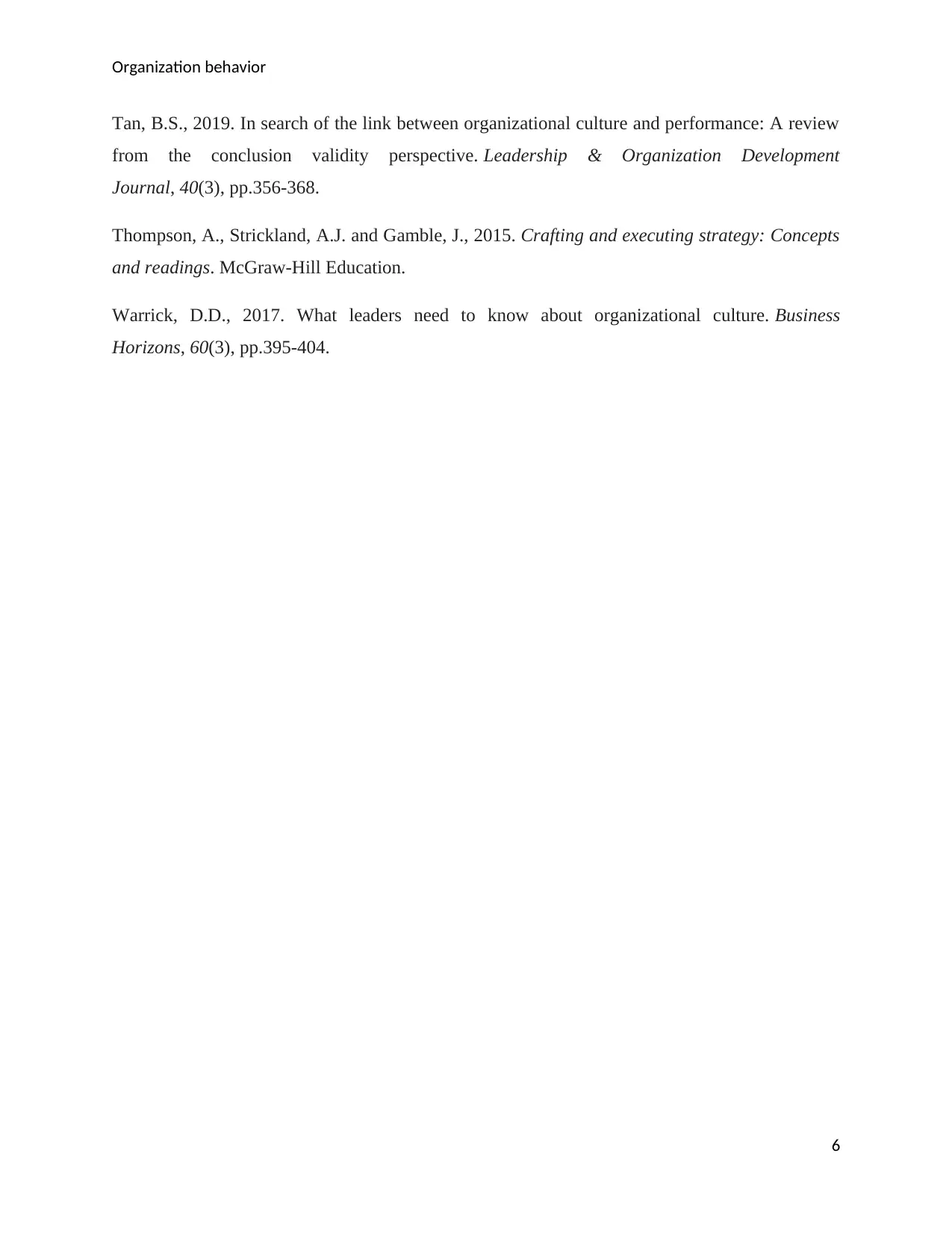
Organization behavior
Tan, B.S., 2019. In search of the link between organizational culture and performance: A review
from the conclusion validity perspective. Leadership & Organization Development
Journal, 40(3), pp.356-368.
Thompson, A., Strickland, A.J. and Gamble, J., 2015. Crafting and executing strategy: Concepts
and readings. McGraw-Hill Education.
Warrick, D.D., 2017. What leaders need to know about organizational culture. Business
Horizons, 60(3), pp.395-404.
6
Tan, B.S., 2019. In search of the link between organizational culture and performance: A review
from the conclusion validity perspective. Leadership & Organization Development
Journal, 40(3), pp.356-368.
Thompson, A., Strickland, A.J. and Gamble, J., 2015. Crafting and executing strategy: Concepts
and readings. McGraw-Hill Education.
Warrick, D.D., 2017. What leaders need to know about organizational culture. Business
Horizons, 60(3), pp.395-404.
6
1 out of 7
Related Documents
Your All-in-One AI-Powered Toolkit for Academic Success.
+13062052269
info@desklib.com
Available 24*7 on WhatsApp / Email
![[object Object]](/_next/static/media/star-bottom.7253800d.svg)
Unlock your academic potential
Copyright © 2020–2026 A2Z Services. All Rights Reserved. Developed and managed by ZUCOL.





